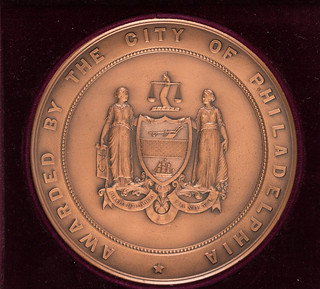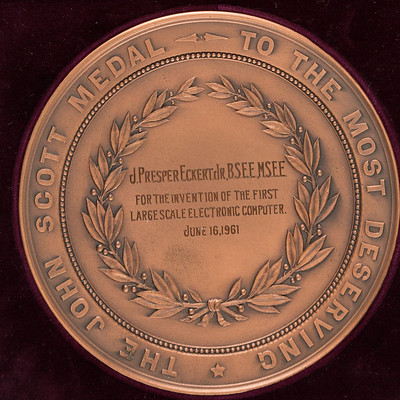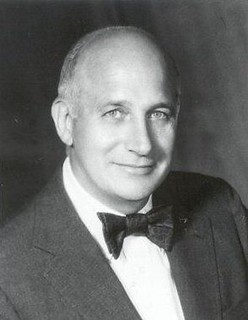
PREV ARTICLE
NEXT ARTICLE
FULL ISSUE
PREV FULL ISSUE
ECKERT'S ENIAC COMPUTER JOHN SCOTT MEDALHeritage Auctions is offering an important medal in the history of science and technology - John Presper Eckert Jr.'s John Scott Medal for the invention of the first large-scale electronic computer, the ENIAC. Here's the press release. -Editor   A medal awarded for one of the most significant technological advancements in the last century is among the most intriguing lots offered in Heritage Auctions’ Americana & Political Auction Feb. 22-23 in Dallas, Texas. The John Scott Medal Awarded to John Presper Eckert Jr. in 1961 "For The Invention Of The First Large Scale Electronic Computer" Known as the ENIAC carries a pre-auction estimate: $10,000+, but there is a very real chance the return at auction could far exceed that total. The copper medal, with a 102-mm diameter and bearing the seal of the city of Philadelphia, is given by the city to "the most deserving" men and women whose inventions have contributed in some outstanding way "to the comfort, welfare and happiness" of mankind. The first medal was issued in 1822. "Computers are such an integral part of our everyday lives, at home, at work, in our cars … everywhere," Heritage Auctions Americana Director Tom Slater said. "The importance and value of computers that evolved from Eckert’s invention can not be overstated." The ENIAC not only was the first large-scale computer, but also the first reprogrammable general-use computer. The reverse of the medal, which was shared by Eckert and John Mauchley, his partner in the development of the computer, reads: "The John Scott Medal – To The Most Deserving" with engraved text at center surrounded by laurel branches: "J. Presper Eckert Jr, BSEE, MSEE/ For The Invention Of The First/ Large Scale Electronic Computer./ June 16, 1961." It is enclosed in a custom leather case that measures 5 by 5-1/2 by 1 inch, with "John Scott Medal/ J. Presper Eckert, Jr." embossed in gold on the top. This medal comes from the collection of Eric C. Caren, whose collecting interests ranged from newspapers to posters to broadsides to manuscripts and eyewitness letters.
Eckert and Mauchley started their own company, the Electronic Control Company, in 1946, and three years later built the Binary Automatic Computer (BINAC), which featured the first stored-program (magnetic tape) in the United States. They received an order from the National Bureau of Standards to build the UNIVAC, the first of which was bought and dedicated March 31, 1951, by the United States Census Bureau. The UNIVAC was the first American computer designed for business and administrative use. The notoriety of the machine and the potential of computer technology got a considerable boost when Eckert’s company teamed up with CBS News to predict the outcome of the 1952 Presidential election. Despite polls showing Adlai Stevenson as the race’s leader, the UNIVAC predicted Dwight Eisenhower would win a lopsided victory. The projection was dismissed by skeptics, but ultimately proved to be accurate. Other winners of the John Scott Medal include such scientific luminaries as Thomas Edison, Marie Curie, the Wright Brothers and Jonas Salk. For images and information about this and the rest of the 966 lots in the auction, visit HA.com/6215 . Here's an excerpt from the lot description. -Editor In the eminent company of Thomas Edison, Nikola Tesla, Marie Curie, the Wright Brothers, Guglielmo Marconi, Alexander Fleming, and Jonas Salk. The John Scott Medal Awarded to John Presper Eckert Jr. in 1961 "For The Invention Of The First Large Scale Electronic Computer" Known as the ENIAC. A beautiful and impressive copper medal of 102mm diameter and 496 grams bearing the seal of the city of Philadelphia ("Philadelphia Maneto" or "Let Brotherly Love Endure") on the obverse with the text around: "Awarded By The City Of Philadelphia". The reverse bears the text around: "The John Scott Medal - To The Most Deserving" with engraved text at center surrounded by laurel branches: "J. Presper Eckert Jr, BSEE, MSEE/ For The Invention Of The First/ Large Scale Electronic Computer./ June 16, 1961". It is enclosed in a custom 5" x 5.5" x 1" leather case with "John Scott Medal/ J. Presper Eckert, Jr." embossed in gold on the top. The award that year was shared by Eckert and John Mauchley, his partner in the development of the computer. The John Scott Award is given by the city of Philadelphia to "the most deserving" men and women whose inventions have contributed in some outstanding way to the "comfort, welfare, and happiness" of mankind. In this particular case, one would be hard-pressed to think of an invention that has affected mankind's comfort, welfare, or happiness in such an important and positive way. The ENIAC was not only the first large-scale computer, but the first reprogrammable general use computer. Most people reading this lot description are doing so on a personal computer, tablet, or smart phone; all are, in various ways, direct descendants of the ENIAC (Electronic Numerical Integrator and Computer) and the UNIVAC (UNIVersal Automatic Computer), both developed by J. Presper Eckert. Can one even imagine a world without the timely work of Eckert and Mauchley? J. Presper "Pres" Eckert Jr. (1919-1995) was born in Philadelphia to a wealthy family. In high school, he joined the Engineer's Club of Philadelphia and could often be found in the laboratory of television inventor Philo Farnsworth. His parents encouraged him to study business at University of Pennsylvania's Wharton school but he soon transferred to Penn's Moore School of Electrical Engineering where, in 1940 at age twenty-one, he applied for and was awarded his first patent for "Light Modulating Method and Apparatus." In 1943, the Moore School was awarded a contract to develop a computing machine using (then) fast vacuum tubes with Eckert as the project's chief engineer. The ENIAC was completed in 1945 and unveiled to the public in 1946. The creator of this prestigious award, first presented in 1822, was an Edinburgh pharmacist named John Scott. He set up a fund in 1816 calling upon the "Corporation of Philadelphia entrusted with the management of Dr. Franklin's legacy" to bestow upon "ingenious men or women who make useful inventions" a premium not to exceed twenty dollars and a suitably inscribed copper medal. The medal is still being awarded to this day (with a much larger cash prize). Several of the well-known fellow winners are mentioned above so it is easy to see the distinguished company Eckert joined in 1961. To read the complete lot description, see:
Wayne Homren, Editor The Numismatic Bibliomania Society is a non-profit organization promoting numismatic literature. See our web site at coinbooks.org. To submit items for publication in The E-Sylum, write to the Editor at this address: whomren@gmail.com To subscribe go to: https://my.binhost.com/lists/listinfo/esylum All Rights Reserved. NBS Home Page Contact the NBS webmaster 
|
